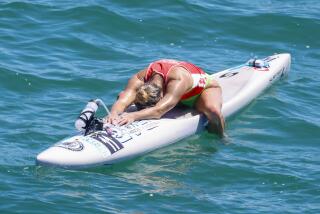Once Again, the Ironman Brings Out the Best : Triathlon: Australian wins, Newby-Fraser extends streak, Venice’s Franks displays another dimension of willpower.
- Share via
KAILUA-KONA, Hawaii — Welcome to hell. Feel privileged for the invitation.
Then again, when the heat is so intense coming off the black asphalt that some have painted the bottoms of their shoes white in hopes of deflecting at least a few degrees, when the 50 m.p.h. gusts whip in the face during the 112-mile bike ride, feel privileged to be able to feel anything besides that I.V. needle in the arm.
“You go through a lot of times during the day saying, ‘Why didn’t I just take the job at 7-Eleven?’ ” said Paula Newby-Fraser, who has been to you-know-where and back 10 times now.
There are more grueling ways to see what gives out first, the body or the mind, like those double ironmans that last two days. And for pure course difficulty, the race in Lanzarote, Canary Islands, is much more brutal, the hills in Penticton, Canada, far more unforgiving. But none are more glamorous, more prestigious than the Gatorade Ironman Triathlon, the world championship on the Big Island’s Kona Coast.
The 1,500 competitors have been culled from 20,000 hopefuls during 20 qualifying domestic and international races, making this an elite gathering for the sport, with all but 185 having earned a spot through performance. They come here to win or finish the Ironman, not win or finish a mere triathlon.
The heat that reaches 110 degrees on the pavement and the 85% humidity more than make up for those places where the course might be relatively gentle. They hate the 2.4-mile ocean swim, the 112-mile bike ride and the 26.2-mile run--all within 17 hours--so much they love it.
“The mile markers on the highway,” said Mark Allen, who won the previous five titles before taking a sabbatical this year. “When the wind blows hard, you see every single one. One hundred and twelve miles can go by very slowly. Twenty-six miles goes by very slowly. It’s like time expands.”
Said Newby-Fraser, an Encinitas resident who has won the race the last four years and seven times in all: “You sort of have to make your peace with the island. The wind blows so hard and it’s so unpredictable. It takes the strongest of people with the most resolve and absolutely crumbles them.”
Yeah, isn’t it great.
Said Greg Welch of Australia, who became the first non-American to win the men’s division: “That’s the heart of it all. That only one thousand five hundred people get to maybe wreck their bikes.”
Welch finished in 8 hours 20 minutes 27 seconds, Newby-Fraser in 9:20:17.
It has a different appeal to Jon Franks, a chiropractor from Venice. Making good on a vow made a few days after he lost the use of both legs in a 1985 motorcycle accident, he became the first wheelchair athlete ever in the event, which started in 1978. That doesn’t count 1988, when he crashed the start by beginning his swim off to the side, only to drop out before the bike ride because he realized it would be impossible to continue to dodge security.
There was no sneaking around this time, not with television cameras tracking his progress. He started the swim three minutes after the pack, using a plastic brace to keep his legs straight out, a weblike glove to help as he backstroked the 2.4 miles and a wet suit, prohibited for other competitors, to help his buoyancy. He practiced by swimming between the piers in Manhattan Beach and Hermosa Beach.
His bike looked like a wheelchair, only closer to the ground and powered by his arms and shoulders through a hand crank in front of his chest, with a choice of 21 gears. He would have to zigzag up some hills that were too steep to attack straight on without a significant loss of speed. The wheelchair he used in the marathon-distance “run” had one gear--his hand slapping on the rims.
“They (onlookers) will see that somebody in the wheelchair is not some little decrepit, deaf, dumb and blind leper,” said Franks, who was still on the course late Saturday night. “They’ll see that somebody in a wheelchair is able to compete in a big-time event. And if I get a little respect for everyone in a wheelchair, that’s great.”
He was wrong about getting a little respect--he got a lot of respect and admiration from fellow competitors. The part about being in a big-time event, that he was right about.


